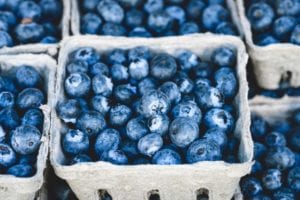Written by Joyce Smith, BS. Consuming one cup of blueberries per day for six months resulted in significant sustained improvements in vascular function and arterial stiffness and reduced cardiovascular risk by up to 15%.
 Metabolic syndrome (Mets), affecting one-third of our Western population, increases the risk of developing both type two diabetes and cardiovascular disease 1. Prospective studies have demonstrated that higher anthocyanin-rich blueberry consumption is associated with lower all-cause mortality 2, as well as a reduced risk of both type 2 diabetes 3 and cardiovascular disease (CVD) 4. Since no long-term randomized controlled trials (RCTs) have been done in at-risk populations, Curtis et al, conducting the longest RCT to date, investigated the effect of six months of blueberry consumption on insulin resistance and cardiometabolic function in participants with metabolic syndrome.
Metabolic syndrome (Mets), affecting one-third of our Western population, increases the risk of developing both type two diabetes and cardiovascular disease 1. Prospective studies have demonstrated that higher anthocyanin-rich blueberry consumption is associated with lower all-cause mortality 2, as well as a reduced risk of both type 2 diabetes 3 and cardiovascular disease (CVD) 4. Since no long-term randomized controlled trials (RCTs) have been done in at-risk populations, Curtis et al, conducting the longest RCT to date, investigated the effect of six months of blueberry consumption on insulin resistance and cardiometabolic function in participants with metabolic syndrome.
The double-blind, parallel-arm RCT 5 involved 115 overweight and obese 56-70 year olds (68% males) with body mass index of 25.8-39.6 kg/m2, who consumed 1 cup blueberries (n=37), ½ cup blueberries (n=39), or placebo(n=39) daily for 6 months. Insulin resistance was assessed as well as clinically relevant cardiometabolic endpoints [including flow-mediated dilatation, augmentation index, lipoprotein status (by nuclear magnetic resonance spectroscopy), and nitric oxide (NO)-related metabolite assay] and anthocyanin metabolism.
Researchers found that eating one cup of blueberries per day (150 grams in freeze-dried form), but not a half cup (75 grams) resulted in sustained improvements in vascular function and arterial stiffness, which made a difference great enough to reduce the risk of cardiovascular disease by a significant 12-15%.
Following the 6-month daily consumption of one cup of blueberries significant improvements were observed in:
- Endothelial function (flow-mediated dilatation: +1.45%; 95% CI: 0.83%, 2.1%; P = 0.003),
- Systemic arterial stiffness (augmentation index: –2.24%; 95% CI: –3.97%, –0.61%; P = 0.04)
Of the statin non-users (n=71), those who consumed one cup of blueberries per day had significant improvements in the following:
- Elevated high-density lipoprotein cholesterol (+0.08 mmol/L; P = 0.03).
- High-density lipoprotein particle density (+0.48n, ×10–6; P = 0.002).
- Apolipoprotein A-I concentrations (+0.05 g/L; P = 0.01).
Total concentrations of anthocyanin-derived phenolic acid metabolites significantly increased, dose-dependently, in serum and 24-h urine (P<0.01 and P<0.001, respectively). Insulin resistance, pulse wave velocity, blood pressure, NO, and overall plasma thiol status were unaffected.
The research team concluded that the improvement in endothelial function and systemic arterial stiffness in an at-risk population with MetS was likely due to improvements in NO activity and lipid status. Consuming one cup of blueberries a day is attainable and may be a simple way to improve cardiovascular health. A potential study limitation was the predominately white study population which does not allow for generalization to other ethnicities.
Source: Curtis, Peter J., Vera van der Velpen, Lindsey Berends, Amy Jennings, Martin Feelisch, A. Margot Umpleby, Mark Evans et al. “Blueberries improve biomarkers of cardiometabolic function in participants with metabolic syndrome—results from a 6-month, double-blind, randomized controlled trial.” The American journal of clinical nutrition 109, no. 6 (2019): 1535-1545.
© American Society for Nutrition 2019. All rights reserved. This is an Open Access article distributed under the terms of the Creative Commons Attribution License (http://creativecommons.org/licenses/by/4.0/)
Click here to read the full text study.
Posted June 26, 2019.
Joyce Smith, BS, is a degreed laboratory technologist. She received her bachelor of arts with a major in Chemistry and a minor in Biology from the University of Saskatchewan and her internship through the University of Saskatchewan College of Medicine and the Royal University Hospital in Saskatoon, Saskatchewan. She currently resides in Bloomingdale, IL.
References:
- Vishnu A, Gurka MJ, DeBoer MD. The severity of the metabolic syndrome increases over time within individuals, independent of baseline metabolic syndrome status and medication use: the Atherosclerosis Risk in Communities Study. Atherosclerosis. 2015;243(1):278-285.
- Ivey KL, Jensen MK, Hodgson JM, Eliassen AH, Cassidy A, Rimm EB. Association of flavonoid-rich foods and flavonoids with risk of all-cause mortality. British Journal of Nutrition. 2017;117(10):1470-1477.
- Muraki I, Imamura F, Manson JE, et al. Fruit consumption and risk of type 2 diabetes: results from three prospective longitudinal cohort studies. Bmj. 2013;347:f5001.
- Cassidy A, Bertoia M, Chiuve S, Flint A, Forman J, Rimm EB. Habitual intake of anthocyanins and flavanones and risk of cardiovascular disease in men. The American journal of clinical nutrition. 2016;104(3):587-594.
- Curtis PJ, van der Velpen V, Berends L, et al. Blueberries improve biomarkers of cardiometabolic function in participants with metabolic syndrome—results from a 6-month, double-blind, randomized controlled trial. The American journal of clinical nutrition. 2019;109(6):1535-1545.
